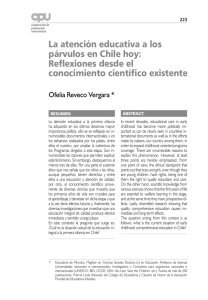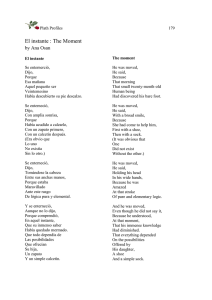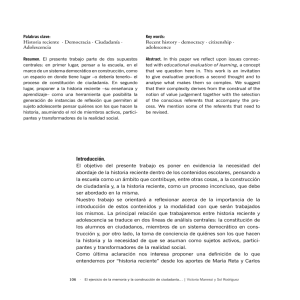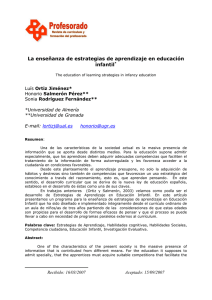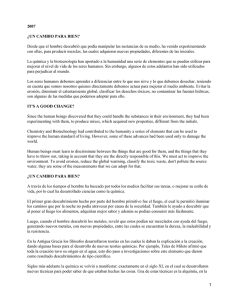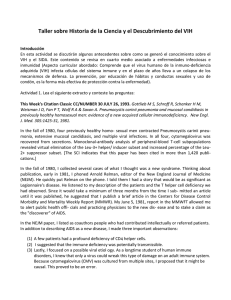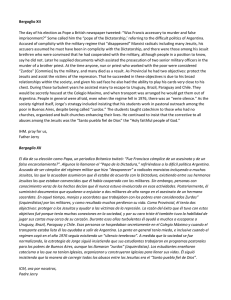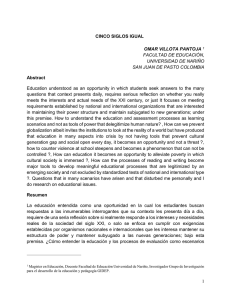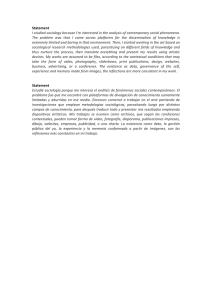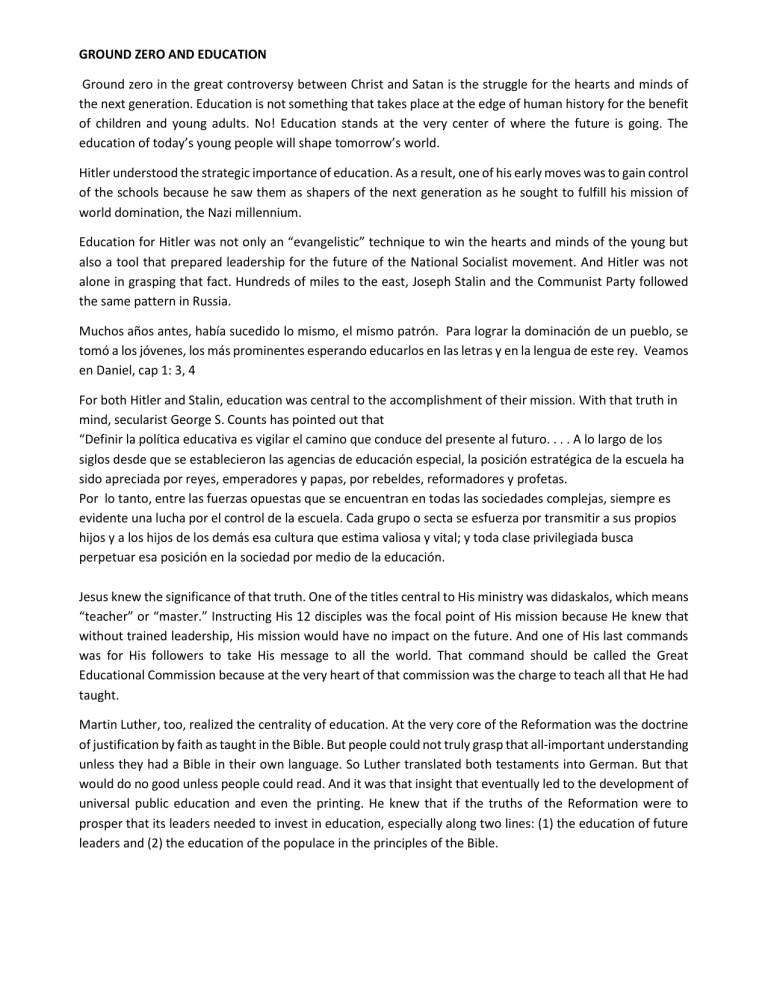
GROUND ZERO AND EDUCATION Ground zero in the great controversy between Christ and Satan is the struggle for the hearts and minds of the next generation. Education is not something that takes place at the edge of human history for the benefit of children and young adults. No! Education stands at the very center of where the future is going. The education of today’s young people will shape tomorrow’s world. Hitler understood the strategic importance of education. As a result, one of his early moves was to gain control of the schools because he saw them as shapers of the next generation as he sought to fulfill his mission of world domination, the Nazi millennium. Education for Hitler was not only an “evangelistic” technique to win the hearts and minds of the young but also a tool that prepared leadership for the future of the National Socialist movement. And Hitler was not alone in grasping that fact. Hundreds of miles to the east, Joseph Stalin and the Communist Party followed the same pattern in Russia. Muchos años antes, había sucedido lo mismo, el mismo patrón. Para lograr la dominación de un pueblo, se tomó a los jóvenes, los más prominentes esperando educarlos en las letras y en la lengua de este rey. Veamos en Daniel, cap 1: 3, 4 For both Hitler and Stalin, education was central to the accomplishment of their mission. With that truth in mind, secularist George S. Counts has pointed out that “Definir la política educativa es vigilar el camino que conduce del presente al futuro. . . . A lo largo de los siglos desde que se establecieron las agencias de educación especial, la posición estratégica de la escuela ha sido apreciada por reyes, emperadores y papas, por rebeldes, reformadores y profetas. Por lo tanto, entre las fuerzas opuestas que se encuentran en todas las sociedades complejas, siempre es evidente una lucha por el control de la escuela. Cada grupo o secta se esfuerza por transmitir a sus propios hijos y a los hijos de los demás esa cultura que estima valiosa y vital; y toda clase privilegiada busca perpetuar esa posición en la sociedad por medio de la educación. Jesus knew the significance of that truth. One of the titles central to His ministry was didaskalos, which means “teacher” or “master.” Instructing His 12 disciples was the focal point of His mission because He knew that without trained leadership, His mission would have no impact on the future. And one of His last commands was for His followers to take His message to all the world. That command should be called the Great Educational Commission because at the very heart of that commission was the charge to teach all that He had taught. Martin Luther, too, realized the centrality of education. At the very core of the Reformation was the doctrine of justification by faith as taught in the Bible. But people could not truly grasp that all-important understanding unless they had a Bible in their own language. So Luther translated both testaments into German. But that would do no good unless people could read. And it was that insight that eventually led to the development of universal public education and even the printing. He knew that if the truths of the Reformation were to prosper that its leaders needed to invest in education, especially along two lines: (1) the education of future leaders and (2) the education of the populace in the principles of the Bible. The idea of the centrality of education in the struggle for the hearts and minds of the next generation seems clear enough. Christ understood it, as did Hitler, Stalin, Luther, the Puritans, Ellen White, the leaders of the American democratic system, and the Roman Catholics. But some Seventh-day Adventists have failed to grasp one of the most elementary facts of political and religious history—namely, that education stands at ground zero in the great controversy. Jesús mismo como maestro, no vió resultados en ese momento. El muere en la cruz, resucita posteriormente y es tiempo después que esos discípulos aparentemente no prometedores, dieron fruto a 30, a 60 y a ciento por 1. Jesús había plantado semillas que con el tiempo brotó en una cosecha mundial. Eso es lo que hacen todos los educadores, los nuestros y los de cualquier otro sistema de creencias, siembran semillas que darán fruto. Yet it is one of the sad facts of Adventist history that the denomination had a difficult time supporting Christian education. It would be nearly 20 years before the denomination established its first successful school. That 1872 school became Battle Creek College in 1874, the year that Adventism sent its first official foreign missionary. The development of the denomination’s first college and the sending of its first missionary in the same year was no accident. The Adventist leadership had come to recognize that it had a duty to preach the three angels’ messages to all the world. And, if it was to do so, it needed an educational system to prepare pastors, editors, translators, and other skilled individuals to work not only in English but also in other languages. Por ello Elena G de White escribió: “Con semejante ejército de obreros como el que nuestros jóvenes, bien preparados, podrían proveer, ¡cuán pronto se proclamaría a todo el mundo el mensaje de un Salvador crucificado, resucitado y próximo a venir!”—La Educación, 271. HEMOS PERDIDO ESA VISIÓN. Hemos perdido de vista que LA EDUCACIÓN ES LA ZONA CERO DEL GRAN CONFLICTO Y SIN LA EDUCACIÓN DE NUESTRO LADO DIFÍCILMENTE ALCANZAREMOS LOS OBJETIVOS QUE DIOS HABÍA TRAZADO PARA NOSOTROS. El sentido de misión, el sentido de servir a otros es un elemento que se ha dejado de inculcar en los jóvenes al estar alejados de un sistema educativo que los forme con estos valores. Y quiero resumir algunos de los aspectos importantes por los que el sistema de educación adventista es relevante, y debiera considerarse no como una opción más sino como la Zona Cero: donde ocurre la acción: 1. ESTABLECE UN MEDIO AMBIENTE POSITIVO Y FAVORABLE PARA EL DESARROLLO Y LA FORMACIÓN DE LOS NIÑOS Y JÓVENES. In puberty they become more social and that implies they became more attuned to peers and to social pressure with profound implications in moral decision making. Their brains are very sensitive to adjust and learn from their environment so we must be careful about to which environment they should adapt that’s what education is for. Positive friends. 2. It’s not just about what they’re taught but how they are taught what matters and that we can create a lasting impression. “La guerra contra nosotros mismos es la batalla más grande que jamás se haya reñido. El rendirse a sí mismo, entregando todo a la voluntad de Dios, requiere una lucha; mas para que el alma sea renovada en santidad, debe someterse antes a Dios.” El Camino a Cristo pág. 32
